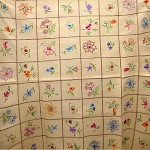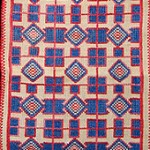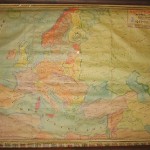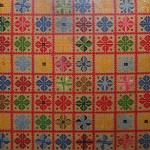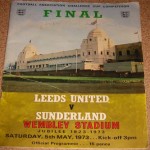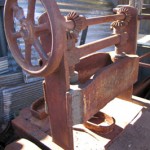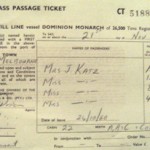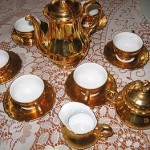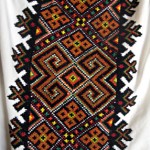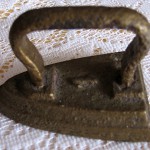Greek
Alexandria, Egypt
Piraeus, Athens, Greece in December 1956
Pyrmont, Sydney on 11 January 1957
Dad rented 59 Cambridge Street, Paddington [in Sydney's eastern suburbs].
Accounting machine operator at Commonwealth Bank in Haymarket, Sydney CBD.
Hairdresser in own business in Canley Vale; office work at U-Rect-It at Yennora; fitness training at Wetherill Park Fitness Centre – all in SW Sydney.
I was born Anthippi Protopsaltis in Alexandria, Egypt on 26 January 1944 but I found that when I came to Australia in 1956, [my] name was difficult to pronounce, so in time it was shortened to Ann. My married name is Cusack. My parents were Greek and my father was born in Greece but Mum was born in Egypt.
My mother did not work, as was the custom. She would organise my father to go to work each morning, tidy the house and then go to the shop to buy food for the night’s meal; she shopped daily as we had no refrigeration at home. She took [my only sister and I] to the park regularly until we went to school. She also liked to visit her relatives, many of whom were quite well off.
Dad worked as a compositor in Egypt but could not qualify for that when we came to Australia. He worked at Adams Hotel in Sydney washing saucepans until he qualified here at TAFE and then worked at the Government Printing Office as well as at Adams. He also did cleaning for Cahill’s restaurants. He was a very hard working man and died when he was only 64 of a massive heart attack. My mother lived to the age of 97 and died only five years ago. She was excellent at needlework and her pieces are very eye catching and beautiful. I have three pieces made by my mother that are particularly dear to me. They are beautifully worked and the backs are nearly as neat as the fronts. They remain now as loving reminders of her.
In Alexandria, where I was born, we lived in an apartment on the fifth floor. Of course there were no lifts and my grandparents found it very difficult to negotiate the stairs. My grandfather passed away when I was about nine years old and my sister and I had to share the double bed with my grandmother. All the walls in the apartment were whitewashed and my mother painted them every couple of years. The floors were of terrazzo tiles.
My schooling in Alexandria was in a Greek school which was also an orphanage. In summer we had to take yeast, and in winter we had cod liver oil as a precaution against bad health. To disguise the cod liver oil, we were given mandarins [and] sweet potato.
My most prized possession is without doubt the map of Europe, western Asia and northern Africa which I drew when I was just 10 years old. It is drawn on parchment-type paper which has become very fragile and brittle over the 54 years since it was drawn. It is all hand drawn and I am very proud that I was able to create it. Our education in Alexandria, at the Greek school, was comprehensive enough that I was able to do such an impressive piece. It will be handed down to my granddaughter or goddaughter.
I loved school but when I had completed my primary schooling my father decided to migrate to Australia. My uncle had already migrated and kept writing asking for us to come too. My father was on a very poor wage in Egypt and there were also some problems building up in Egypt as Greek schools were starting to [be] disallow[ed]. That helped him decide to migrate.
The ship on which we sailed was Tasmania and it was a Jewish ex-war ship which had been converted. To get to the ship we had to travel by boat from Alexandria to Greece. That would have been in December 1956 but I can’t remember the exact date. As I left Egypt, I threw a rock at the shore and I remember that I said, “I don’t want to come back here”. It was a strange feeling.
I brought many pieces of embroidery to Australia with me and one that I dearly love is [this] red and blue oblong piece. I was only six when I made it and I had already learnt to create fine handiwork. It is a quality that all the women in my family seemed to possess and they started to teach me needlework from an early age. It is a wonderful memory of Mum, who taught me how to embroider.
From Greece we went onboard Tasmania at the town of Piraeus. It was hell onboard the ship as it caught fire in the middle of the ocean, but was soon attended to. What was worse was that we had bed bugs in [our] room where about eight people slept. The dining room was made all of metal and the long tables were also metal. The food would be at one end one minute and the next it would have slid down to the other. At one stage the water ran rusty and we could not drink it.
The food onboard to us was awful. We had British food which we did not like. We were fed beef and gravy, which we had never eaten before, so we gorged on whatever we could find like fruit and stuff like that. The ship took 40 days to come to Australia and we were all glad to be off her. I believe it was then put away as it was no longer fit for humans to travel on.
We were not assisted migrants. My father had already arrived in Australia a year before us and had borrowed our fares from a Greek organisation. I don’t remember what organisation it was. We arrived on 11 January at Pyrmont [in Sydney] and my father and my cousin were there to meet us. It was so exciting! We arrived in the harbour during the day so we could see it all. The Opera House was not here at that time, I can remember that, and I can remember that there were also many people waiting for brides who had come from Greece.
We went straight to my aunt’s place in Mosman [on Sydney’s north shore], taking only our hand luggage, as we had to collect the remainder the next day. My mother was very clever and house proud and her belongings were most important to her. She brought absolutely everything with her. She brought two divans made up in boxes which she screwed together later and made two single beds. She had brought mattresses and also my grandmother’s single iron bed. She brought all the dishes that we had.
My dad rented 59 Cambridge Street, Paddington [in Sydney’s eastern suburbs], which consisted of one room at the front, a little room and a little kitchen at the back. We remained there for five years and I did my schooling at Glenmore Road Public School, then went to Darlinghurst High School and finally to Sydney High.
My first job was in the Commonwealth Bank in Haymarket where I became an accounting machine operator. A few years later I married for the first time. My husband was Italian and we had three children, and now have 10 grandchildren under the age of eight. The marriage broke up and later I married again. My second husband John is a teacher. We have no children together.
When I was first married, we lived in a house at 116 McBurney Street, Cabramatta [in south-west Sydney]. Within a short time it housed an extended family of about a dozen; they were all my husband’s relatives and it was all too much for me. We bought another house in Hubert Street, Fairfield and moved there. My husband chose to remain with his relatives but came back and forth. My father died and left me some money, so we built another house at Prairiewood but I had so much trouble with the marriage that I decided to make a complete break and left the house I had thought [was] my dream home. I moved to Wetherill Park and remained there until John and I decided to build this house.
My first husband decided to buy a hairdressing salon in Canley Vale and as he was a men’s hairdresser, I decided to learn hairdressing between having children so that I could do women’s hair. Just as I finished my apprenticeship he decided to sell the salon. It had been hard work; I can remember doing six or seven permanent waves when I was seven months pregnant because staff did not come to work that particular day. We found that staff could be so unreliable.
From hairdressing I went to work at a company named U-Rect-It which was in Yennora. I was doing office work and remained there for four years. I then discovered fitness and joined an aerobic class. I liked it so much that I thought I should take on a job in fitness. I worked in various fitness centres such as Carramar, Cabramatta, Fairfield Heights and then a friend and I commenced classes in Wetherill Park, which we had for four years. We left it when we saw a leisure centre opening in opposition so I joined [them] and have been there for over 15 years now. The business has expanded and I have done a variety of tasks. I have now reduced my work to part-time, but the hours are slowly creeping up again. I love the work though and that’s why I am still there.
My two sons, grandson and I went to Egypt for a holiday in 1986 and everything seemed so small to us. I would never think of returning there to live.
[John and I] have been to Nepal and trekked to the Everest area. We met a wonderful young man and decided to help by sponsoring him to Australia. We are fortunate living here in Australia but there are many who live in countries who have absolutely nothing. It is important we help them as we are fortunate to live in the best country in the world.





